News & Events
His voice still resonates
On 3 September 2021, Unisa hosted the 12th Es’kia Mphahlele Annual Memorial Lecture under the topic The Responsibility of the African Scholar in a Season of Anomie: Hearkening to the Voice of Es’kia Mphahlele. The event was hosted virtually.
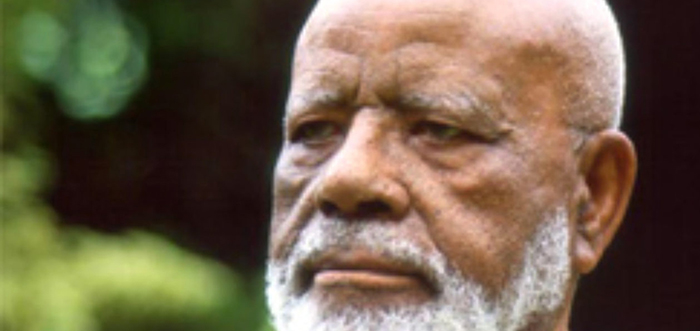
The late Es’kia Mphahlele (Image: Brand South Africa - www.brandsouthafrica.com)
Click here to access the profile of Mphahlele published by Unisa’s History and Memory Project.
Professor Adebayo O. Olukoshi, Director for Africa and West Asia at the International Institute for Democracy and Electoral Assistance (IDEA), delivered the memorial lecture. He described Mphahlele as an academic, artist and activist who was revered as the father of African humanism and one of the founding figures of modern African literature.

Prof. Adebayo O. Olukoshi (Image: International IDEA)
Olukoshi said that “Stanislas the Renegade” is one poem that stood out for him. “The poem is in an anthology of African contemporary writers compiled by Wole Soyinka,” he said. “The theme of the renegade behaviour which Mphahlele addresses frontally in the poem is one which resonates very much with me in what I have described for this lecture as the season of anomie that our continent is going through.”
Olukoshi’s first encounter with Mphahlele was at Ahmadu Bello University in the geographical north of Nigeria when he was an undergraduate student. He said: “It was a period of intense intellectual, political and civic activism among Nigerian scholars and students. The campus of Ahmadu Bello University, as most other campuses of Nigerian universities, as well as universities further afield like the University of Ghana at Legon, Fourah Bay College in Sierra Leone, Makerere University in Uganda, the University of Dar Es Salaam in Tanzania and the University of Liberia were abuzz with lively discussions and debates about the direction of post-colonial Africa and the role of the university community in helping to shape that future.”
“Out of Mphahlele’s declaration, drawing on his experience, that ‘…you need an intimate familiarity with the world you depict. You need a locale, its smell, its taste, its texture…’ and his observation that ‘… you are tied to the place that contains the experience’, we have a clarion call to rediscover an organicity that liberates us from the shackles of received wisdom and invent knowledges that speak to our history, our needs, and our aspirations,” continued Olukoshi. “This will necessarily mean that we take responsibility for our continent and do so with the full confidence that as partakers in the triumphs and travails of our people, we have a duty to engage fulsomely and without apology, learning, teaching, proposing, critiquing, and rebuking as the context demands.”
Olukoshi said that Mphahlele, for all his travails, never disengaged. “There is a lesson in that,” he continued. “Mphahlele, for all the dangers and terror he faced, never succumbed. There is also another lesson in that. Mphahlele, for all the knowledge he acquired, never forgot ancestry and community. There is an instruction in that. And Mphahlele at all times saw himself as an unapologetic change agent who did not hesitate to speak truth to power, not for the sake of any vainglory but for the collective good. There is a lesson to take home in that as well. And for those among us who may be tempted to uproot ourselves from the demands of our context, it may be worth remembering that Es’kia Mphahlele was that herder boy who from Marabastad, Soweto and Sophiatown, and through the groundings he had with the ordinary people eking out a living in Bariga, Nigeria, emerged into a global person of letters celebrated for the fact that he remained true to his roots.”
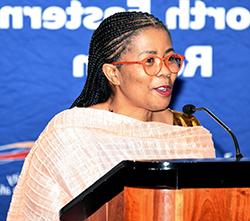
Prof Puleng LenkaBula (Unisa Principal and Vice Chancellor) welcomed participants at the 12th Es’kia Mphahlele Lecture |
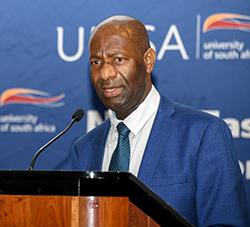
Prof Sepota, Director of North Eastern Region sets the tone of the 12th Es'kia Mphahlele Lecture by giving an overview and history of the Lecture |
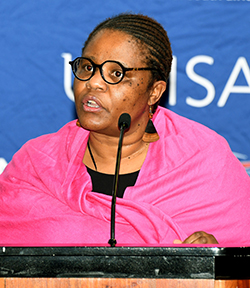
Prof Grace Khunou (Acting Director: Unisa’s Department of Institutional Advancement) was a discussant at the lecture |
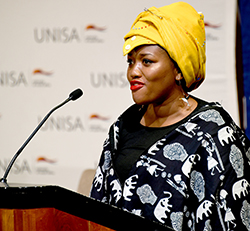
Ms Nombulelo Shange (Sociology Lecturer: University of Free State) was a discussant at the lecture |
In her address, Professor Puleng LenkaBula, Unisa Principal and Vice-Chancellor, reiterated that the memory of Mphahlele is worth celebrating. In honour of the great man of letters, she quoted the following from one of his poems:
What is there that we can do or say
|
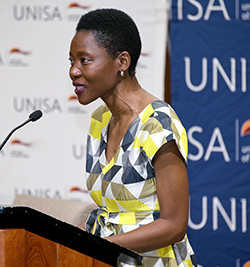
Prof Puleng Segalo, Unisa Chief Albert Luthuli Chair |
Professor Moloko Sepota, Regional Director of Unisa’s North Eastern Region, lauded Mphahlele as an icon who touched many lives globally.
*By Lesego Ravhudzulo, Journalist, Department of Institutional Advancement
Publish date: 2021-09-09 00:00:00.0

